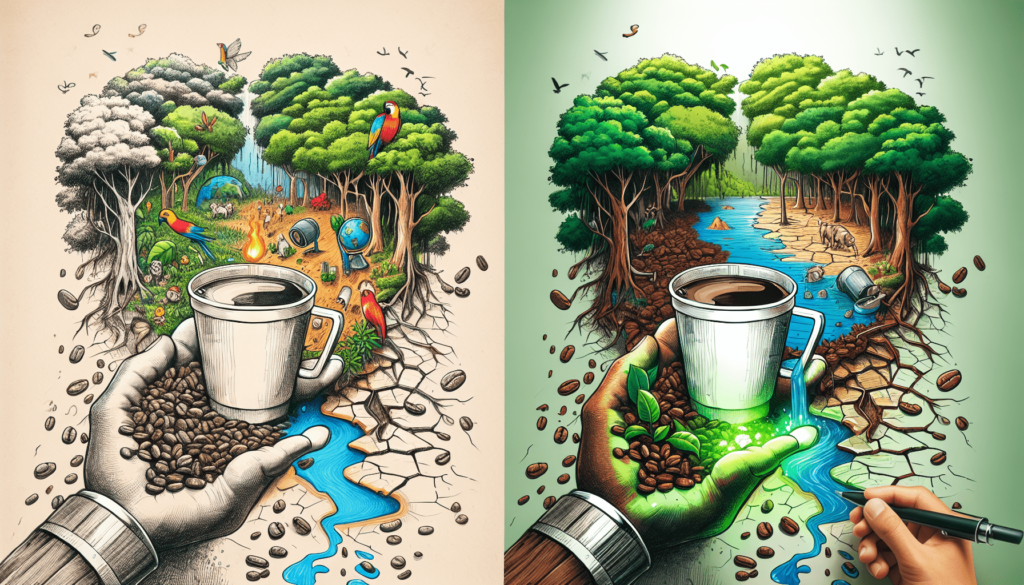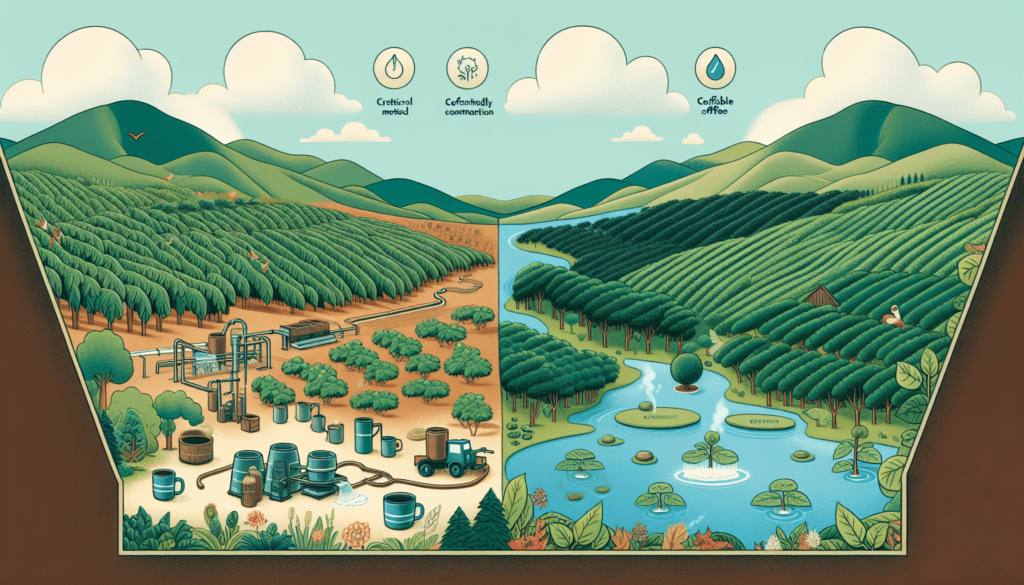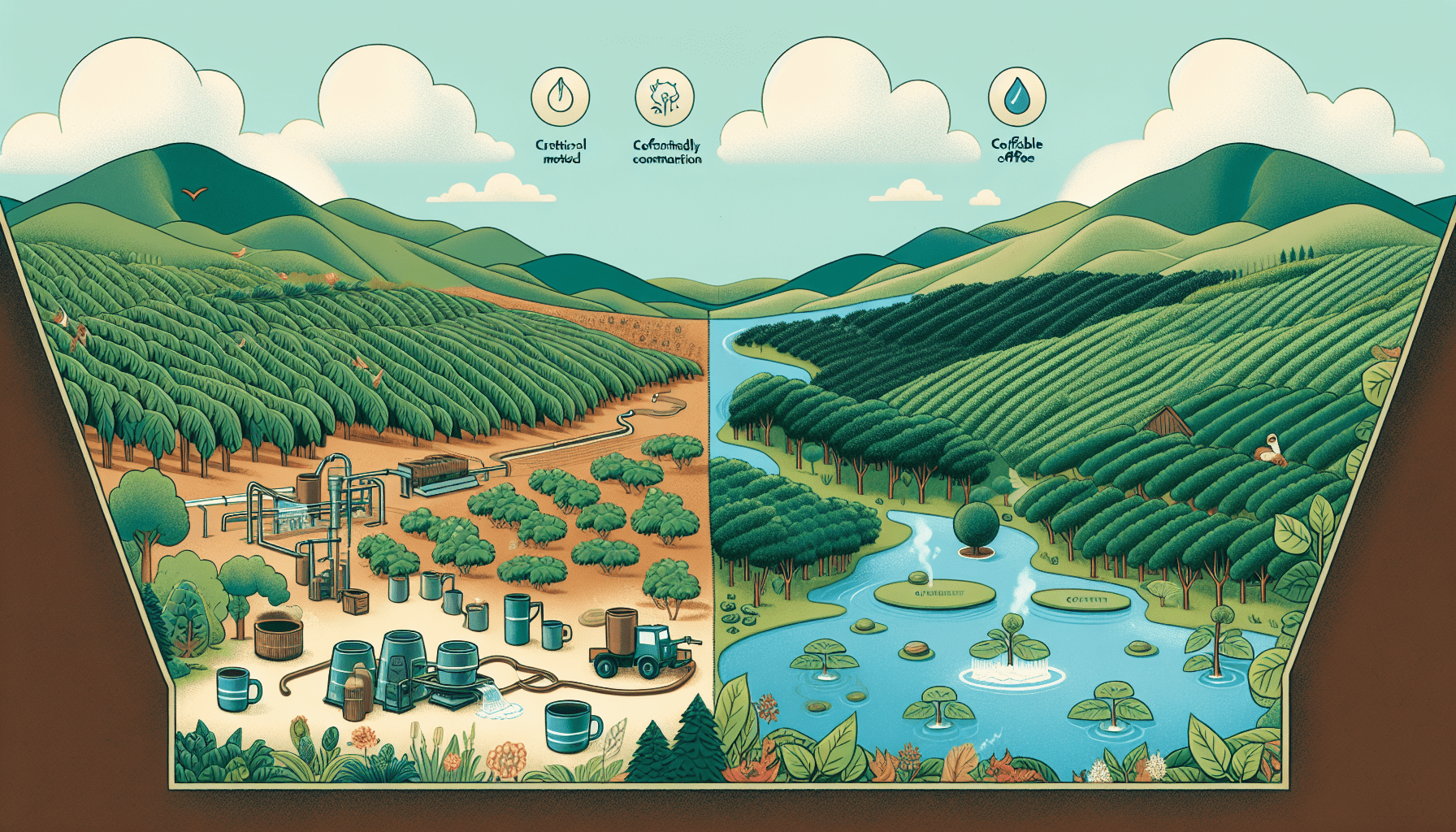Coffee is a beloved beverage enjoyed by millions around the world, but have you ever stopped to think about the environmental impact of its production? In this article, we will explore the various ways in which coffee production affects the environment. From deforestation and habitat destruction to water pollution and greenhouse gas emissions, the processes involved in growing and harvesting coffee beans can have significant consequences for our planet. By understanding these impacts, we can all make more informed choices and work towards a more sustainable future for our morning cup of joe.
Deforestation
Clearing of forest for coffee plantations
The clearing of forests for coffee plantations has been a major cause of deforestation in many parts of the world. As the demand for coffee continues to rise, vast areas of forests are being cut down to make room for coffee farming. This clearing of forests not only eliminates valuable habitats for various wildlife species but also disrupts the delicate balance of ecosystems.
Loss of biodiversity
The loss of biodiversity is another significant consequence of deforestation for coffee plantations. Forests are incredibly diverse ecosystems, home to countless plant and animal species. When these forests are destroyed to make way for coffee cultivation, many species lose their natural habitats and are at risk of extinction. The loss of biodiversity can have far-reaching ecological implications, affecting the overall health and resilience of ecosystems.
Erosion and soil degradation
Deforestation for coffee farming also leads to erosion and soil degradation. Forests play a crucial role in preventing erosion by holding soil in place with their extensive root systems. However, when forests are cleared, the exposed soil is vulnerable to erosion caused by wind and rain. This erosion can lead to the loss of nutrient-rich topsoil, making the land less fertile for future agriculture. Additionally, without the protective canopy of trees, the soil is more prone to drying out and becoming degraded.
Water Consumption
High water requirements for coffee cultivation
Coffee cultivation requires significant amounts of water, making it a water-intensive crop. From irrigation to processing, water is used throughout the entire coffee production process. This high demand for water puts pressure on water sources, especially in regions where water scarcity is already a concern. As coffee production continues to expand, the depletion of water sources becomes a pressing environmental issue.
Depletion of water sources
The depletion of water sources is a direct consequence of coffee production. As water is extracted from rivers, streams, and underground sources to meet the irrigation needs of coffee plants, the natural flow of water is disrupted. This depletion can lead to reduced water availability for surrounding ecosystems, wildlife, and local communities, exacerbating water scarcity issues in the region.
Water pollution from processing
The processing of coffee beans also contributes to water pollution. In some coffee-producing regions, the processing methods involve washing the coffee beans, which generates large amounts of wastewater. This wastewater often contains chemical residues, such as pesticides and fertilizers, which can contaminate nearby water bodies. This pollution can have detrimental impacts on aquatic life and further degrade water quality.

Chemical Use
Pesticides and herbicides in coffee farming
The use of pesticides and herbicides in coffee farming is a common practice to control pests and weeds that can negatively impact crop yields. However, the use of these agrochemicals can have detrimental effects on the environment. Pesticides can contaminate soil and water, leading to long-term environmental degradation. Additionally, the excessive use of herbicides can contribute to the development of herbicide-resistant weeds, creating a cycle of chemical dependency.
Contamination of soil and water
The use of pesticides and herbicides in coffee farming can result in soil and water contamination. These chemicals can seep into the soil and contaminate groundwater sources, affecting both the immediate environment and downstream ecosystems. Soil contamination can reduce soil fertility and hinder the growth of other crops, while water contamination can have negative impacts on aquatic life and human health.
Health risks for farmers and local communities
The use of pesticides and herbicides in coffee farming also poses health risks for farmers and local communities. Prolonged exposure to these chemicals can have adverse effects on human health, including respiratory problems, skin conditions, and even long-term systemic health issues. Furthermore, contaminated water sources can lead to the ingestion of these chemicals, further compromising the health and well-being of communities living in or near coffee-producing areas.
Carbon Footprint
Greenhouse gas emissions from cultivation, processing, and transportation
Coffee production contributes to greenhouse gas emissions throughout its entire lifecycle. From the cultivation of coffee plants to the processing and transportation of coffee beans, each stage releases carbon dioxide and other greenhouse gases into the atmosphere. The intensive use of machinery, fossil fuels, and electricity in these processes significantly contributes to the carbon footprint of coffee production.
Deforestation and land use change contribute to carbon emissions
The deforestation associated with coffee farming contributes to carbon emissions. When forests are cleared, the carbon stored in trees and vegetation is released into the atmosphere as carbon dioxide, a potent greenhouse gas. Additionally, the conversion of land for coffee plantations alters the natural carbon sink capacity of ecosystems, further exacerbating the release of carbon dioxide into the atmosphere.
Climate change impacts on coffee growing regions
Climate change poses significant risks to coffee-growing regions worldwide. Rising temperatures, changing rainfall patterns, and increased frequency of extreme weather events can all impact coffee cultivation. Changes in temperature and precipitation can alter the growth and development of coffee plants, affecting yield and quality. Climate change also introduces new pests and diseases that can devastate coffee plantations. Overall, climate change poses a substantial threat to the sustainability and viability of coffee production in many regions.

Energy Consumption
Energy-intensive processing methods
The processing of coffee beans is often energy-intensive, requiring the use of machinery and equipment that consume significant amounts of energy. From pulping and washing to drying and roasting, each step in the coffee production process demands energy. This reliance on energy contributes to the carbon footprint of coffee production and adds to the overall environmental impact.
Use of fossil fuels
The energy consumption in coffee production often relies on the use of fossil fuels. These fuels, such as coal and oil, release carbon dioxide when burned, contributing to climate change. The extraction, transportation, and combustion of these fossil fuels further contribute to environmental degradation, pollution, and the depletion of natural resources.
Contribution to greenhouse gas emissions
The energy consumption in coffee production contributes to greenhouse gas emissions. The burning of fossil fuels releases carbon dioxide and other greenhouse gases into the atmosphere, adding to the accumulation of these gases that drive climate change. The excessive reliance on energy in coffee processing increases the overall carbon footprint of the industry.
Waste Generation
Coffee cherry husks and pulp as waste products
During coffee processing, coffee cherry husks and pulp are generated as waste products. These byproducts are often discarded or left to decompose, leading to potential environmental issues. The accumulation of coffee waste can contribute to pollution and may release methane, a potent greenhouse gas, during decomposition.
Pollution from improper disposal
Improper disposal of coffee waste can lead to pollution of soil and water. If coffee waste is left to rot or disposed of inappropriately, it can contaminate nearby ecosystems. The decomposition process can release harmful substances and contribute to the pollution of water bodies and soil, negatively affecting the surrounding environment.
Opportunities for waste management and recycling
Despite the waste generated in coffee production, there are opportunities for waste management and recycling. Coffee waste can be repurposed and used as fertilizer or compost, providing valuable nutrients to other crops or gardens. Additionally, advancements in technology have allowed for the extraction of useful compounds from coffee waste, such as antioxidants and bioactive compounds, opening up new avenues for utilization and reducing waste.
Loss of Habitat
Conversion of natural habitats for coffee farming
The expansion of coffee farming often involves the conversion of natural habitats, such as forests and grasslands, into agricultural land. This conversion disrupts ecosystems and leads to the loss of critical habitats for countless plant and animal species. The destruction of these habitats threatens biodiversity and can have cascading effects on the overall functioning of ecological systems.
Displacement of wildlife species
The loss of natural habitats due to coffee farming disrupts the habitats of wildlife species. Many animals rely on specific ecosystems for food, shelter, and breeding grounds. When their habitats are destroyed, populations decline, and species may eventually face extinction. The displacement of wildlife has ecological consequences, as it disrupts predator-prey relationships and alters the balance of ecosystems.
Fragmentation of ecosystems
The conversion of natural habitats into fragmented coffee plantations further disrupts ecosystems. Fragmentation occurs when large, continuous habitats are divided into smaller, isolated patches. This fragmentation limits the movement of species, reduces gene flow, and disrupts ecological processes. The loss of habitat connectivity can have significant long-term impacts on biodiversity and ecosystem resilience.
Water Pollution
Runoff of agrochemicals into water bodies
The use of agrochemicals, such as pesticides and fertilizers, in coffee farming can result in the runoff of these substances into nearby water bodies. When rainfall washes over agricultural fields, the residues of these chemicals can be carried into rivers, streams, and lakes, leading to water pollution. This pollution has harmful effects on aquatic life and can disrupt entire ecosystems.
Contamination of rivers and streams
The runoff of agrochemicals from coffee farms can contaminate nearby rivers and streams. These water bodies, which serve as important sources of drinking water and habitat for various aquatic species, suffer from the introduction of harmful substances. The contamination of rivers and streams can lead to the degradation of water quality, posing risks to both human and animal health.
Negative impacts on aquatic life
Water pollution from coffee farming has negative impacts on aquatic life. The introduction of agrochemicals can harm fish, amphibians, and other aquatic organisms, affecting their growth, reproduction, and survival. The loss of these species can destabilize entire ecosystems, leading to long-term ecological consequences.
Social Impact
Exploitative labor practices
Coffee production is often associated with exploitative labor practices, particularly in regions where labor regulations and worker protection are weak. Workers on coffee farms may face long hours, low wages, and poor working conditions. Exploitative labor practices not only harm the workers themselves but also contribute to social inequalities and perpetuate poverty.
Low wages and poor working conditions
Many workers in the coffee industry receive low wages and endure poor working conditions. This includes long working hours, lack of access to proper sanitation facilities, and exposure to hazardous substances. These conditions can have detrimental effects on workers’ physical and mental well-being, trapping them in a cycle of poverty and vulnerability.
Displacement of indigenous communities
The expansion of coffee farming can lead to the displacement of indigenous communities who have historically lived and relied on the land. As forests are cleared for coffee plantations, these communities lose their homes, traditional practices, and connection to the land. The displacement of indigenous communities not only disrupts their way of life but also threatens their cultural heritage and social fabric.
Fair Trade and Sustainability
Promoting environmentally friendly farming practices
Fair trade and sustainability initiatives in the coffee industry aim to promote environmentally friendly farming practices. These initiatives encourage farmers to adopt techniques that minimize the use of agrochemicals, preserve biodiversity, and protect natural resources. By promoting sustainable agriculture, fair trade practices contribute to the reduction of environmental impact and the preservation of ecosystems.
Ensuring fair wages and working conditions
Fair trade and sustainability initiatives also prioritize ensuring fair wages and working conditions for coffee farmers and workers. By providing fair prices for coffee, supporting worker cooperatives, and advocating for improved labor rights, these initiatives aim to address social inequalities and improve the livelihoods of those involved in coffee production. Fair wages and better working conditions contribute to a more sustainable and equitable coffee industry.
Supporting sustainable coffee production
Fair trade and sustainability initiatives play a crucial role in supporting sustainable coffee production. Through certifications and consumer education, these initiatives raise awareness about the environmental and social impact of coffee production. By supporting sustainable practices, such as organic farming and conservation efforts, these initiatives contribute to the long-term viability of the coffee industry while minimizing its negative effects on the environment and communities.
In conclusion, the production of coffee has significant environmental impacts across various aspects. From deforestation and loss of biodiversity to water consumption, chemical use, and waste generation, the coffee industry contributes to a range of environmental issues. The carbon footprint, energy consumption, and water pollution associated with coffee production further exacerbate its environmental impact. Moreover, the social implications of exploitative labor practices and the displacement of indigenous communities cannot be overlooked. However, fair trade and sustainability initiatives offer promising solutions, promoting environmentally friendly farming practices, ensuring fair wages, and supporting sustainable coffee production. By making conscious choices as consumers and supporting these initiatives, we can contribute to a more sustainable and responsible coffee industry.

